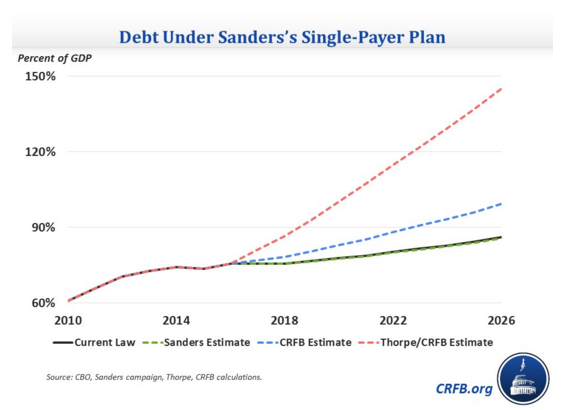Both Political Parties Seek to Replace the Affordable Care Act
Senator Bernie Sanders wishes to create a universal healthcare system to move beyond the Affordable Care Act while House Speaker Paul Ryan introduced a Republican replacement plan earlier this year.

- As previously reported, the major health payer Aetna is leaving the majority of health insurance exchanges it is currently operating in. Some critics have pointed at the failure of the Affordable Care Act to sustain payers within the public exchanges since three large payers including UnitedHealthcare and Humana are now pulling out of this marketplace. Critics have called for a repeal of the Affordable Care Act and House Speaker Paul Ryan even introduced the Republican replacement plan for the ACA.

Some of the ideas floating around within the replacement plan involve selling health plans across state lines, implementing health savings accounts, and increasing the Medicare eligibility age from 65 to 67 years old. However, this replacement plan is looking to keep the ACA provision for keeping pre-existing conditions outside of the payer system. Nonetheless, Paul Ryan’s plan also seeks to abolish Medicaid expansion.
Another option to replace the Affordable Care Act comes from Senator Bernie Sanders, a candidate who formerly ran for the Democratic nominee for President.
Sanders’ Medicare-for-all healthcare system
Sanders has often espoused the idea of creating a Medicare-for-all single-payer system. When learning of Aetna leaving the majority of public health insurance exchanges it is currently operating in, Sanders released a statement that further pushes for universal healthcare coverage.
“It is disappointing that Aetna has joined other large for-profit health insurance companies in pulling out of the insurance marketplace. Despite the Affordable Care Act bringing them millions more paying customers than ever before, these companies are more concerned with making huge profits than ensuring access to healthcare for all Americans,” Sanders said in a public statement.

“In my view, the provision of health care cannot continue to be dependent upon the whims and market projections of large private insurance companies whose only goal is to make as much profit as possible. That is why we need to join every other major country on earth and guarantee health care to all as a right, not a privilege. That is also why we need to pass a Medicare-for-all single-payer system. I will reintroduce legislation to do that in the next session of Congress, hopefully as part of the Democratic Senate majority,” concluded Sanders.
Sanders’ Medicare-for-all system is dependent upon expanding the Medicare program and also building upon the provisions of the Patient Protection and Affordable Care Act. This would allow patients to choose whichever doctors and hospitals they preferred instead of relying upon a health plan’s more narrow provider network.
Since creating a universal healthcare system would mean that health insurance would no longer be linked to employment, Americans would have many more opportunities to pursue different work arrangements and even become stay-at-home parents when necessary.
Potential problems of Medicare-for-all proposal
However, Senator Bernie Sanders’ universal healthcare plan may have some issues, as some economists and policy experts have found that the numbers associated with the Medicare-for-all program may be misleading.
Jared Bernstein, a former economic adviser to Vice President Joe Biden, has stated his concern and the Committee for a Responsible Federal Budget has released a report stating that this proposal would bring a $3 trillion shortfall over the next 10 years.
Kenneth Thorpe, chairman of the health policy and management program at Emory University's school of public health, found an even bigger decline in his analysis. Thorpe estimates that the universal healthcare plan proposed by Sanders would leave a $14 trillion shortfall.
Did the Affordable Care Act benefit consumers?
Whether or not new healthcare reforms coming from both political parties would improve patient care and simplify coverage options will depend upon the test of time. However, it is vital to note whether the Affordable Care Act has actually made a significant impact on boosting patient outcomes and improving healthcare access.
According to a study published in JAMA Internal Medicine, both Medicaid expansion and the private insurance sector led to an increase in the use of outpatient services, a decline in emergency room visits, and better self-reported health status. The results from the study also showed that more preventive care services were being used and the quality of medical care improved.
The researchers looked at three states: Kentucky, Arkansas, and Texas. Changes in coverage were more clearly seen in 2015 as compared to 2014. The uninsured rate dropped more than 22 percent in states that expanded their Medicaid programs. In fact, Medicaid expansion led to reduced out-of-pocket spending, a drop in skipped medications, and an increase in primary care utilization.
Essentially, despite the fact that various political factions are looking to further reform the healthcare system and even repeal the ACA, President Barack Obama’s landmark healthcare law may stand the test of time. The Affordable Care Act and its stimulus to expand state Medicaid programs has clearly brought beneficial outcomes for patients around the country.
Dig Deeper:
Republicans Release Plan to Replace the Affordable Care Act
Sanders’ Universal Healthcare Coverage May Have Pitfalls

